Educating Companies on Regulatory Compliance″
In today’s highly regulated business landscape, ensuring compliance with relevant laws and regulations is of paramount importance. Companies must proactively educate themselves on the intricacies of regulatory compliance to avoid costly penalties and reputational damage. This mini blog will provide a formal, point-by-point overview of the key considerations for educating organizations on regulatory compliance.
1. Identify Applicable Regulations: The first step is to thoroughly research and identify all the regulations and laws that apply to the company’s industry, operations, and geographic locations.
2. Understand Legal Requirements: Closely study the specific legal requirements outlined in the relevant regulations, including reporting obligations, record-keeping, employee training, and other compliance measures.
3. Develop Comprehensive Policies: Establish clear, well-documented policies and procedures to ensure the organization remains compliant with all applicable regulations.
4. Implement Robust Controls: Put in place effective internal controls, such as auditing systems, monitoring processes, and corrective action plans, to detect and address any compliance issues.
5. Provide Ongoing Training: Regularly train employees on regulatory compliance, ensuring they understand their roles and responsibilities in maintaining the company’s adherence to the law.
6. Stay Informed of Updates: Continuously monitor for changes or updates to relevant regulations and adjust the company’s compliance strategies accordingly.
7. Seek Professional Guidance: Consider engaging with legal and regulatory experts to provide specialized advice and support in navigating the complex compliance landscape.
By addressing these key points, companies can proactively educate themselves and their workforce on the critical importance of regulatory compliance, ultimately safeguarding the organization’s long-term success and reputation.
